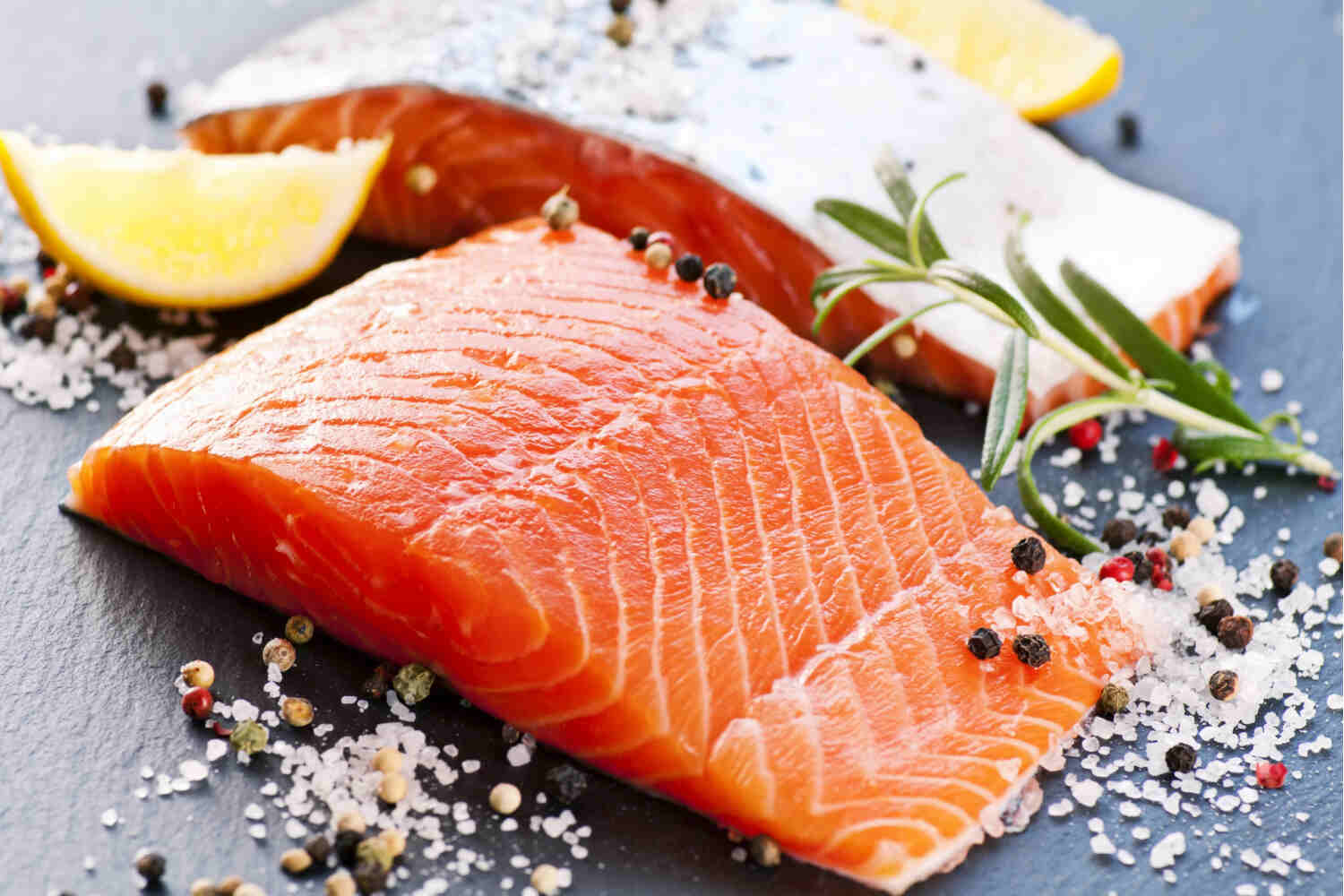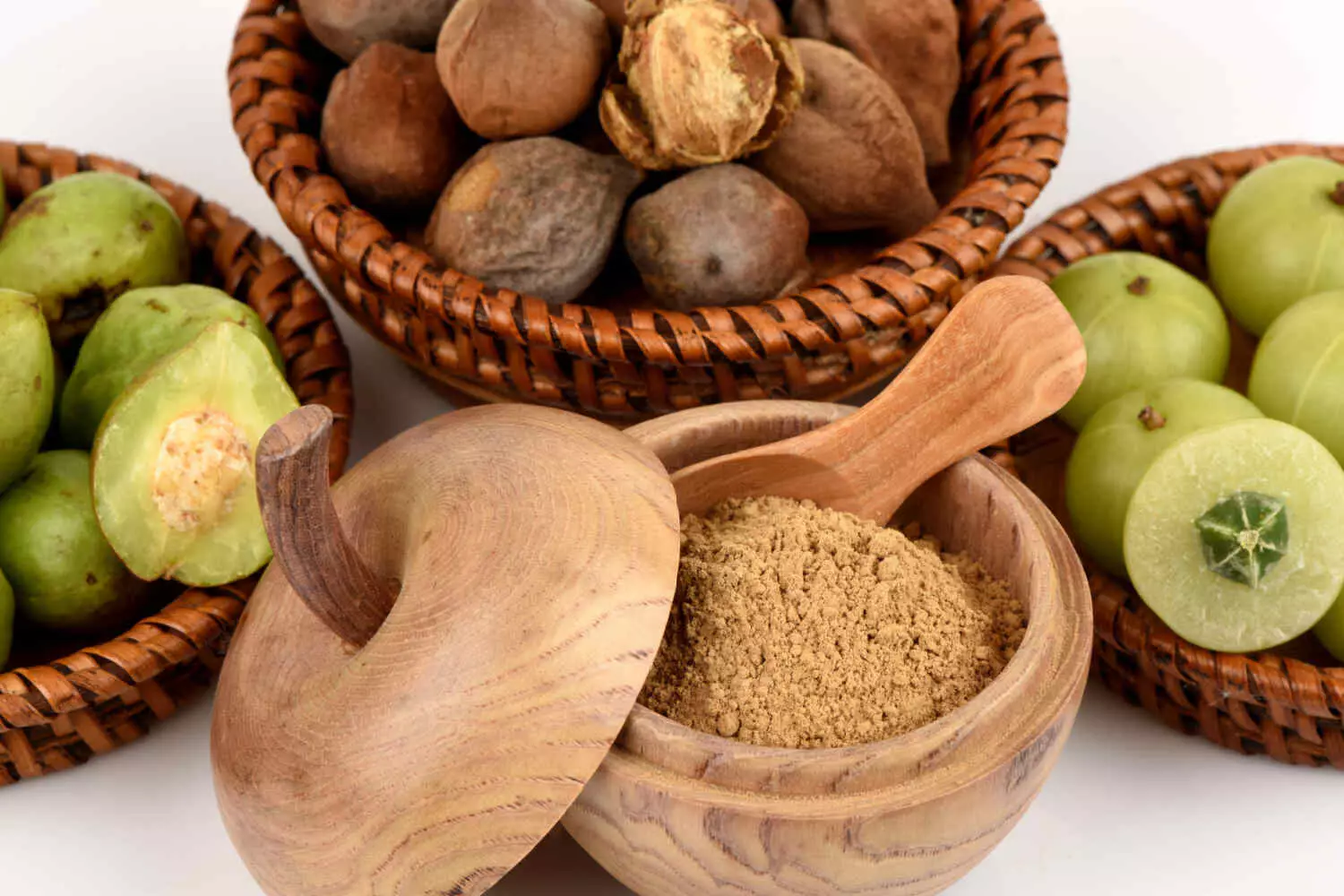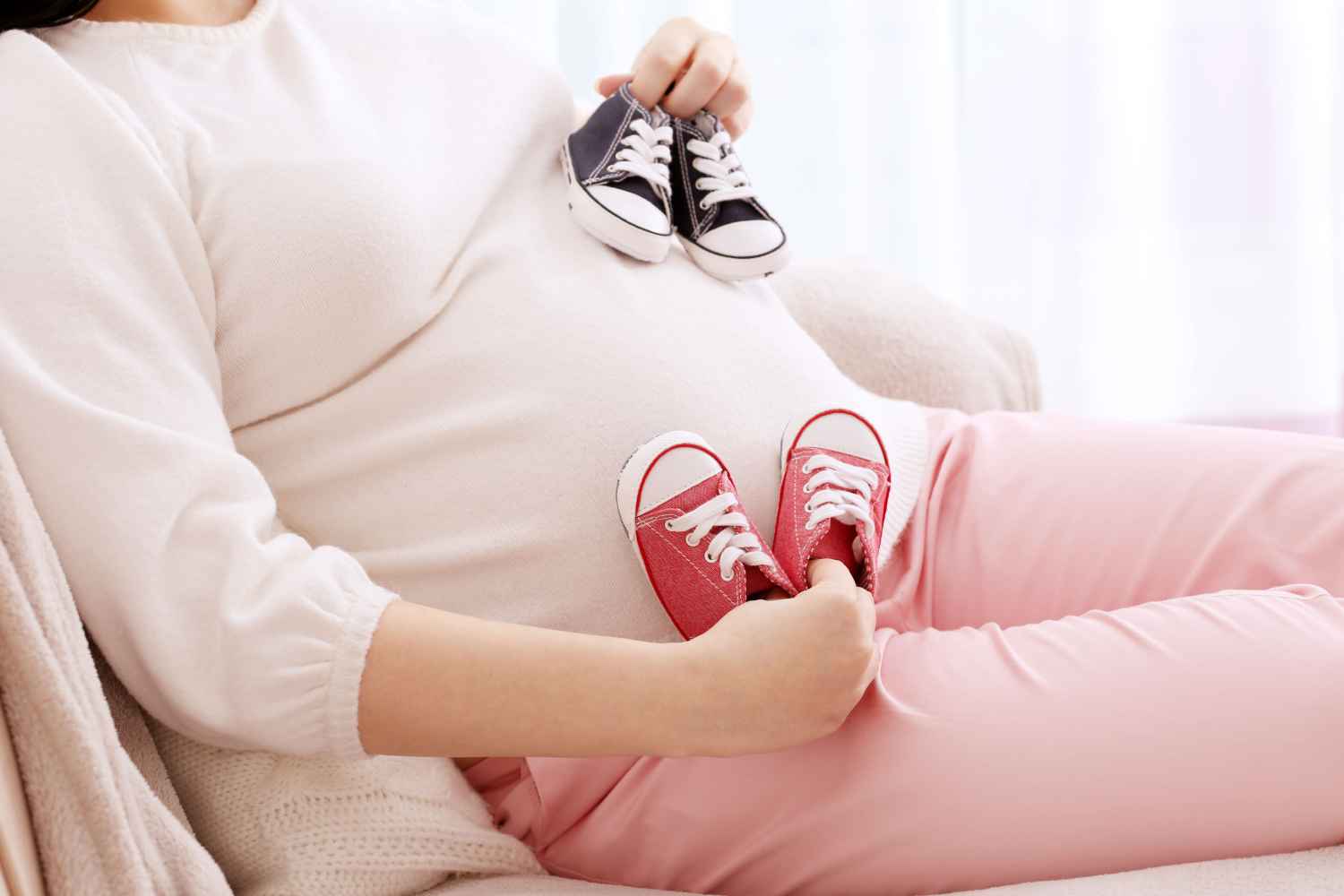
Is It Safe To Eat Salmon During Pregnancy?
10 min readWritten by Editorial Team


During pregnancy, among other things, diet is very crucial. Most foods are healthy when consumed in moderation but some may cause harm to the developing fetus and are therefore best avoided. It is a good idea to consult with your doctor at the beginning of every trimester and make a list of “can eat” and “avoid eating” foods so that you know exactly what to eat and stay healthy throughout the three trimesters. Salmon is one food pregnant women can eat during pregnancy.
Salmon is a fish known for its numerous health benefits that come under the “can eat” list. So, is it safe to eat salmon during pregnancy? Read the article to learn more.
In This Article
- Seafood During Pregnancy
- Is It Safe To Eat Salmon During Pregnancy?
- Nutritional Value Of Salmon
- Benefits of Consuming Salmon During Pregnancy
- Side Effects of Consuming Excess Salmon During Pregnancy
- Which Types Of Salmon Are Safe For Pregnant Women?
- Ways To Include Salmon Fish In Your Pregnancy Diet
- Precautions While Consuming Salmon During Pregnancy
- FAQs
Seafood During Pregnancy
Seafood lovers need to be cautious. Most fish and shellfish are rich in omega-3 fatty acids, protein, iron, and zinc. However, large fish like sharks, tilefish, and swordfish contain high levels of mercury, which can accumulate in your bloodstream over time if you consume it regularly. This, in turn, could cause considerable damage to your baby’s brain and nervous system and impact its vision and hearing capabilities as well.
Therefore, it is important to know that some fish need to be consumed in moderation. Food experts and health agencies recommend 12 ounces of seafood a week. Again, contaminants in fish are another cause for concern during pregnancy, so it is safer to be careful to ensure that the fish consumed is fresh and cleaned thoroughly.
Is It Safe To Eat Salmon During Pregnancy?

Yes, in general, it is safe to eat salmon during pregnancy and it can be a healthy choice. Salmon is a good source of high-quality protein, omega-3 fatty acids, and various vitamins and minerals, including vitamin D and selenium, which are important for fetal development.
While salmon is a nutritious food, it’s advisable to consume it in moderation. According to the American Pregnancy Association, it is recommended to limit fish consumption to 2-3 servings per week, with each serving being approximately 8–12 ounces (1).
Also, wild-caught salmon is often recommended over farm-raised salmon because it tends to have lower levels of contaminants. Farm-raised salmon may contain higher levels of pollutants and contaminants. Pregnant women should avoid consuming raw or undercooked fish due to the risk of foodborne illnesses, such as salmonella or parasites.
Nutritional Value of Salmon
The nutritional value of salmon is significant. Salmon is a rich source of high-quality protein, omega-3 fatty acids, and essential vitamins and minerals. Because of its high nutritional density and also because it is low in saturated fat and calories, salmon is an excellent addition to the pregnancy diet.
A 100-gram serving of salmon contains the following essential nutrients (2):
| Nutrients | Value |
|
Calories |
142 Kcal |
|
Protein |
19.8 g |
|
Total Fat |
6.34 g |
|
Calcium |
12 mg |
|
Magnesium |
29 mg |
|
Phosphorous |
200 mg |
|
Potassium |
490 mg |
|
Selenium |
36.5 µg |
|
Vitamin B12 |
3.18 µg |
|
Niacin |
7.86 mg |
|
Vitamin B6 |
0.818 mg |
|
Sodium |
44 mg |
|
Folate |
25 µg |
Benefits of Consuming Salmon During Pregnancy

Incorporating salmon into your pregnant diet has several health advantages. This makes it an excellent source of nutrients for women expecting a child. Here are eight strong arguments in favor of eating salmon during pregnancy, which is good for mom and baby:
1. Beneficial For Fetal Brain Development
Salmon is a rich source of nutrients that are beneficial for fetal brain development. During pregnancy, the fetus relies on the mother’s dietary intake of omega-3 fatty acids for its development, especially in the third trimester, when the brain undergoes significant growth. DHA plays a role in the formation of nerve cell membranes and contributes to overall brain structure and function.
One key nutrient found in salmon is omega-3 fatty acids, particularly docosahexaenoic acid (DHA) and eicosapentaenoic acid (EPA) (3). The development of the fetus’s brain and eyes relies heavily on these crucial fatty acids. DHA is a crucial component of the brain and is essential for the development of the fetal brain and nervous system.
2. High-Quality Protein Source
Proteins serve as the basic building blocks of life. Protein is present in every cell of the human body. The basic structure of a protein consists of a sequence of amino acids (4). Protein is a fundamental building block for the development of tissues in the fetus as well. It includes the unborn baby’s organs, muscles, and other body structures. Salmon provides a high-quality protein source that contains all the essential amino acids needed for proper fetal growth.
3. Bone Health
One of the most essential nutrients for calcium absorption, vitamin D, is found naturally in salmon. The proper growth of a baby’s bones and teeth depends on its ability to absorb enough calcium. The mineral phosphorus is also essential for bone development. During pregnancy, the need for phosphorus rises; thus, it is especially vital to provide an appropriate supply. During full-term gestation, the average fetus accumulates approximately 30 g of calcium, 20 g of phosphorus, and 0.8 g of magnesium. These minerals are essential for the mineralization of the fetus’s skeleton and for the proper functioning of its physiological processes (5). Salmon is rich in these nutrients.
4. Red Blood Cell Formation
Salmon is a rich source of vitamin B12. Vitamin B12 is essential for producing red blood cells (6). Thus, eating salmon during pregnancy plays a crucial role in avoiding anemia when expecting a child. The mother and her developing child benefit from it in the long run.
5. Helps To Prevent Oxidative Stress
It is not uncommon for pregnant women to experience oxidative stress. It can lead to negative consequences for cellular well-being. Salmon is an excellent source of the potent antioxidant selenium. This antioxidant defense is essential to preventing oxidative stress (7) in both mother and child.
6. Healthy Skin
Healthy skin is one benefit of eating salmon, thanks to its high niacin (B3) level. Niacin, or vitamin B3, is a water-soluble B vitamin. Of these, niacin is known for its positive effects on skin health. Niacin aids in the synthesis of keratin, a protein that keeps skin healthy. It has also been shown to strengthen, smooth, and brighten skin (8). Eating salmon may help to avoid skin problems that could arise during pregnancy.
7. Low In Mercury
Compared to some other fish, salmon tends to have lower levels of mercury (9). High mercury intake during pregnancy can be harmful to the developing fetus, so choosing fish with lower mercury levels is advisable.
8. Supports Heart Health
Many people know that eating salmon can help their heart health because of the omega-3 fatty acids it contains. Omega-3 fatty acids have been shown to lower blood triglyceride levels. It is also observed that omega-3 fatty acid supplements enhance flow-mediated arterial dilatation and cardiac mechanical performance (10). The mother’s and the unborn baby’s hearts can benefit from a regular salmon diet. At this formative stage, it helps the cardiovascular system as a whole.
[Read: Know Everything About Your Baby’s Brain and Nervous System]
Side Effects of Consuming Excess Salmon During Pregnancy

In most people’s opinions, salmon is a healthy and safe option to eat while pregnant. But, like with any diet, knowing there may be some negative consequences, particularly when taken in large quantities, is essential. Here is a thorough examination of the potential adverse effects:
1. Mercury Concerns
Fish with high mercury levels can be harmful to a pregnant woman. Thankfully, salmon is considered a seafood low in mercury (9). Pregnant women should know that even though mercury levels are considered low, there is still a danger. Excessive salmon consumption may be a factor in the body accumulating mercury. It might present dangers to the growing fetus.
2. Allergies
Although uncommon, some people may be allergic to fish (11). The severity of allergic responses varies. It might cause symptoms including swelling, hives, or trouble breathing. Doctors suggest that expectant mothers watch out for any indications of allergic reactions. If they do, they need to get medical help right away.
3. Digestive Issues
Bloating and indigestion are two symptoms of excessive salmon eating that can affect the digestive system. This emphasizes how crucial moderation is when adding salmon to the diet. In moderation, one can get the advantages without experiencing discomfort.
4. Contaminant Risks
Selecting the proper kind of salmon is essential because contaminants might be an issue. Wild-caught salmon is generally considered safer than farmed salmon since the latter may include toxins like dioxins or PCBs. To reduce the dangers, pregnant women should choose their salmon sources carefully.
5. Potential For Foodborne Illness
Foodborne infections can result from salmon that has been incorrectly prepared, just like with other raw or undercooked meat. It’s critical to make sure the salmon is cooked through to reduce this risk. Proper cooking eliminates dangerous germs and parasites. It protects against possible infections for both the mother and the growing child.
Which Types Of Salmon Are Safe For Pregnant Women?

Pregnant women should be careful with their decisions because not all salmon are made equal. These are the salmon varieties that are safest for expectant mothers to eat:
1. Canned or Tinned Salmon
Salmon, canned or preserved, is typically acceptable to eat while pregnant, but it must be low in mercury. Choose “wild-caught” kinds if you want less pollution in the ecosystem. Some types of canned salmon may contain raw fish. Always check the label to ensure that the product is safe for consumption during pregnancy. One easy way to use salmon in salads, sandwiches, or pasta meals is to use canned salmon.
2. ‘Ready To Eat’ Salmon Packets
For expectant mothers, “ready-to-eat” salmon packets provide a practical and secure choice. Typically, grilled and pasteurized salmon are included in these packets. Foodborne disease risk is reduced as a result. They are ideal for salad dressing, protein additions, fast dinners, and snacks.
3. Cooked, Fresh, or Frozen Salmon Steak
Salmon steaks, whether cooked, frozen, or fresh, are great for expectant mothers. Make sure you cook it well to get rid of any germs or pollutants. Fish cooked using healthy techniques like grilling, baking, or broiling keeps its nutritional value.
4. Cold, Cooked Salmon
If salmon is appropriately prepared and kept, it can be safely served cold, as in sushi or cold salads. But it’s essential to pay attention to the freshness and source. Choose reputable restaurants if you’re eating raw or very barely cooked salmon.
Ways To Include Salmon Fish In Your Pregnancy Diet
 Beyond the conventional preparations, there are many inventive and delicious ways to include salmon in meals during pregnancy. Pregnant women are in danger of bacterial illness. Thus, it is always important to steer clear of raw preparations. Let’s now examine several inventive methods to include this nutrient-dense superfood in a pregnant diet:
Beyond the conventional preparations, there are many inventive and delicious ways to include salmon in meals during pregnancy. Pregnant women are in danger of bacterial illness. Thus, it is always important to steer clear of raw preparations. Let’s now examine several inventive methods to include this nutrient-dense superfood in a pregnant diet:
1. Grilled Salmon Salad
For a healthy and revitalizing salad, pile a bed of mixed greens with grilled salmon, cherry tomatoes, and a drizzle of light vinaigrette.
2. Salmon Tacos
If you’re expecting a child, try making tacos using avocado, salsa, and flaked salmon instead of the usual ingredients.
3. Baked Salmon with Lemon
For an easy and flavorful main dish, bake salmon fillets marinated with herbs, garlic, and lemon juice.
4. Salmon Stir-Fry
In a stir-fry, mix salmon with a rainbow of bright veggies for a healthy and fast dinner.
5. Salmon Patties
Make delicious salmon patties by combining canned salmon with breadcrumbs, an egg, and seasonings. Cook in a skillet or bake until golden brown.
6. Salmon and Quinoa Bowl
Make a balanced lunch by mixing cooked quinoa with grilled salmon and roasted veggies.
[Read: Shrimp During Pregnancy]
Precautions While Consuming Salmon During Pregnancy

Here are some of the precautions you have to follow while having salmon during pregnancy:
- Opt for low-mercury fish
- Choose wild-caught salmon over farm-raised salmon whenever possible, as it often has lower levels of contaminants.
- Consume salmon in moderation.
- Ensure that salmon is cooked thoroughly to an internal temperature of 145°F (63°C) to eliminate the risk of bacteria or parasites.
- Avoid raw or undercooked salmon.
- Follow proper food safety practices, including storing salmon at appropriate temperatures, avoiding cross-contamination, and practicing good hygiene in the kitchen.
- Choose fresh salmon and check for any signs of spoilage, such as an off smell or discolored flesh.
- If you have any allergies or concerns, monitor for allergic reactions after consuming salmon.
Non-vegetarians cannot avoid seafood during pregnancy as it is a storehouse of powerful nutrients that ensure a safe and healthy pregnancy, delivery, and post-delivery health. The only option, as with every other food consumed during pregnancy, is to stay within limits and know what you are eating and where you are getting it from. When in doubt, it is always best to check with your doctor. Pregnancy is a phase filled with food cravings that must be satisfied. Enjoy this phase and stay safe.
Did you include salmon in your diet when you were pregnant? Do share your experience with us and some healthy recipes of including salmon in your pregnancy diet.
FAQs
1. Can I Consume Smoked or Canned Salmon During Pregnancy?
Both smoked and canned salmon can be consumed during pregnancy, but with certain precautions. Ensure that the smoked salmon is from a reputable source and has been properly refrigerated. It’s advisable to avoid consuming raw or undercooked smoked salmon. Choose canned salmon labeled “wild-caught” for lower mercury levels. It’s also preferable to select products with fewer additives. Ensure the can is not damaged and the salmon has been properly processed.
2. How Long To Cook Salmon When Pregnant?
When cooking salmon during pregnancy, it’s essential to ensure that it reaches a safe internal temperature to eliminate any potentially harmful bacteria or parasites. The recommended internal temperature for salmon is 145°F (63°C).
Read Also: Crab During Pregnancy Is It Safe To Eat?
Reference
- Eating Seafood During Pregnancy – [https://americanpregnancy.org/healthy-pregnancy/pregnancy-health-wellness/eating-seafood-during-pregnancy/]
- Fish, salmon, Atlantic, wild, raw – [https://fdc.nal.usda.gov/fdc-app.html#/food-details/173686/nutrients]
- Omega-3 Fatty Acids: An Essential Contribution – [https://www.hsph.harvard.edu/nutritionsource/what-should-you-eat/fats-and-cholesterol/types-of-fat/omega-3-fats/]
- Protein in diet – [https://medlineplus.gov/ency/article/002467.htm]
- Calcium and Phosphate Metabolism and Related Disorders During Pregnancy and Lactation – [https://www.ncbi.nlm.nih.gov/books/NBK279173/]
- Vitamin B12–Deficiency Anemia – [https://www.nhlbi.nih.gov/health/anemia/vitamin-b12-deficiency-anemia]
- Selenium: its role as an antioxidant in human health – [https://www.ncbi.nlm.nih.gov/pmc/articles/PMC2698273/]
- Nicotinic acid/niacinamide and the skin – [https://pubmed.ncbi.nlm.nih.gov/17147561/]
- MERCURY IN FISH – [https://oehha.ca.gov/media/downloads/fish/fact-sheet/hgfactsnontechnical.pdf]
- Omega-3 Supplements and Cardiovascular Diseases – [https://www.ncbi.nlm.nih.gov/pmc/articles/PMC4153275/]
- Fish allergy – [https://acaai.org/allergies/allergic-conditions/food/fish/]

Editorial Team,
With a rich experience in pregnancy and parenting, our team of experts create insightful, well-curated, and easy-to-read content for our to-be-parents and parents at all stages of parenting.Read more.
Responses (0)
Want curated content sharply tailored for your exact stage of parenting?
Sponsored content
Discover great local businesses around you for your kids.
Get regular updates, great recommendations and other right stuff at the right time.











